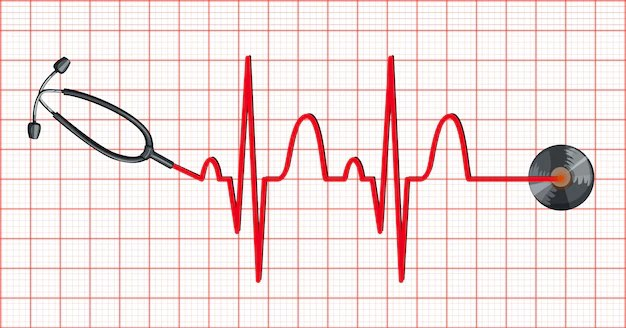What are the symptoms of a heart murmur?
.png?v=1673519157449)

Related products
Overview
A heart murmur is an abnormal sound that can be heard through a stethoscope when a doctor listens to your heart. It can indicate a more serious underlying heart condition, so it is essential to be aware of the symptoms that may accompany a heart murmur.
This blog post will discuss the common symptoms associated with a heart murmur, the potential causes and complications, and available treatments.
Heart Murmur

A heart murmur is an extra or unusual sound heard during a heartbeat. It is caused by turbulent blood flow within the heart and may indicate a structural or functional abnormality of the heart.
What Causes a Heart Murmur?
Blood flows through the heart chambers passing through the valves, mitral valve and tricuspid valves, and exits the heart when the left ventricle heart muscle relaxes and releases blood via the aortic valve to the body. Anything that disrupts blood flow through the chambers, be it a defect in the valves or blood clots in the way of blood flowing through, can cause heart murmurs.
Heart murmurs are usually harmless, but they can sometimes indicate a more serious underlying condition, such as heart valve disease or congenital heart defects.
Heart valve disease is the most common cause of abnormal heart murmur and involves a defect in one of the heart valves. Heart murmurs can also result from cardiac dysfunction secondary to coronary heart disease, ischemic heart disease, rheumatic heart disease, and hypertensive heart disease.
Risk Factors of Heart Murmur
The most common risk factors for heart murmurs include ageing, a family history of heart murmurs, high blood pressure, and diabetes. Individuals with these risk factors should seek medical advice to determine if a heart murmur is present and if further treatment is necessary.
Types of Heart Murmur?
Depending on the cause, there are different types of heart murmurs. Some murmur sounds are caused by faulty heart valves, while problems with the heart's walls cause others. Certain types of murmurs are harmless and do not require treatment, while others can be a sign of a more serious condition and require medical attention.
Heart murmurs can be classified as innocent heart murmurs or pathologic or abnormal heart murmurs.
An innocent heart murmur is benign and typically does not require treatment or further investigation. An innocent murmur is commonly seen in pregnant women. On the other hand, an abnormal heart murmur could be a sign of an underlying heart problem and require further medical evaluation.
Based on the timing that the murmurs are heard, heart murmurs can also be classified as:
-
Systolic murmur,
-
Diastolic murmur, and
-
Continuous murmurs
How Common are Heart Murmurs?
They are common in children and adults and can be either benign or indicative of a serious underlying condition. In some cases, a heart murmur may not cause any symptoms at all. If symptoms do occur, they may be mild or severe. If a heart murmur is suspected, a doctor can diagnose it with an electrocardiogram (ECG) or echocardiogram (echo).
Symptoms of a Heart Murmur?

The most common heart murmur symptoms are a whooshing or swishing sound heard when a doctor listens to your heart with a stethoscope.
Other symptoms include:
-
Chest pains or discomfort
-
Feeling tired or weak
-
Shortness of breath
-
Palpitations or feeling a racing or fluttering heartbeat (Irregular or fast heartbeat)
-
Dizziness or lightheadedness
-
Coughing or difficulty breathing
-
Fainting or loss of consciousness
-
Difficulty sleeping
-
A feeling of discomfort or uneasiness that is not easily explained
-
Unexplained weight gain or weight loss
-
Sudden headaches
-
High blood pressure or changes in the blood pressure readings
-
Feeling unusually cold or warm
-
Oedema or swelling in the hands, feet, or abdomen
-
Difficulty concentrating or thinking
-
Heartburn or indigestion
-
Nausea or vomiting
-
Blue tint to the skin.
Sometimes, a heart murmur may be accompanied by an enlarged heart, a condition known as cardiomegaly. In more severe cases, a heart murmur may result in a narrowing of the heart valves, leading to a condition known as aortic stenosis. Seeking medical attention if you experience any of these symptoms is important.
How is a Heart Murmur Diagnosed?
Heart murmurs are often discovered during a routine physical exam, although they may be discovered incidentally during other tests. The doctor will listen to your heart with a stethoscope during a physical exam. If a murmur is heard, the doctor may order further tests to determine the cause and severity. Depending on the severity of the murmur, additional tests might be needed to determine the cause and the best treatment options.
How Can I Prevent Heart Murmurs?
To prevent a heart murmur, the best thing you can do is to maintain a healthy lifestyle. Eating a balanced diet, exercising regularly, and reducing stress can all help to reduce your risk of developing a heart murmur. It is also important to practice good hygiene and get regular checkups from your doctor. If you have a family history of heart problems, it is important to discuss this with your doctor to ensure proper monitoring.
When to Worry About a Heart Murmur
It is important to note that a heart murmur does not always indicate a severe problem. However, chest pain, shortness of breath, dizziness, and fatigue may be associated with an underlying heart condition. If these symptoms occur, it is important to consult with a doctor to determine the cause of the heart murmur. Diagnostic tests such as an electrocardiogram (ECG), echocardiogram, chest x-ray, and blood tests can help diagnose the underlying condition.
Heart murmurs are one of the most common heart problems. They are often discovered during routine checkups by a physician and can be associated with serious health complications. Look out for the common symptoms of heart murmurs to identify them and seek the necessary medical care.
How is Heart Murmur Treated?
Treatment for heart murmurs typically depends on the severity and underlying cause. For instance, mild murmurs often do not require treatment, while severe murmurs may require medications, such as diuretics or surgery. Additionally, lifestyle changes, such as quitting smoking, maintaining a healthy weight, and exercising regularly, may help to manage heart murmurs.
Summary
A heart murmur is an extra or unusual sound heard during a heartbeat. Symptoms of a heart murmur can include chest pain, shortness of breath, dizziness, fainting, fatigue, and swollen ankles. In some cases, there may be no outward signs or symptoms of a heart murmur, and it is often discovered during a routine physical exam. When a heart murmur is detected, a doctor will most likely order additional tests, such as an echocardiogram or electrocardiogram, to determine the cause. Treatment depends on the severity of the murmur and the underlying cause and may include medications, surgery, lifestyle modifications, or a combination of these. Following the doctor's instructions is important to ensure the best outcome.
Take Welzo's Heart Disease Risk at-home Blood Test to learn more about your heart health.
Learn more at Welzo. Read about the Signs and Symptoms of Heart Disease or The Best Diet for a Healthy Heart.

































 Rated Excellent by 26,523+ Reviews
Rated Excellent by 26,523+ Reviews